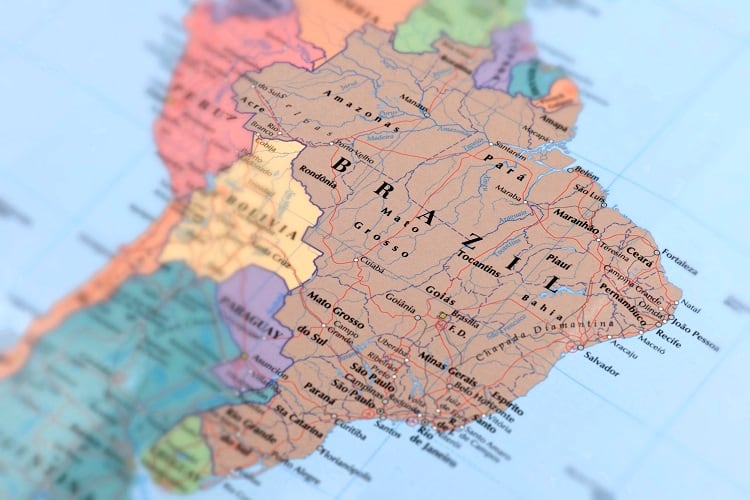Rewilding, organic farming and the ‘nature friendly farming’ measures included in some government conservation policies risk worsening the global biodiversity crisis by reducing how much food is produced in a region, driving up food imports and increasing environmental damage overseas.
In an article published in the journal Nature, Professor Ian Bateman of the University of Exeter and Professor Andrew Balmford of the University of Cambridge urge policy-makers to consider a bolder approach known as ‘land sparing’, which they argue is cheaper, more effective, and avoids the displacement of food production and loss of wildlife habitats overseas.
What is land sparing?
Land sparing involves finding lower-impact ways to boost yields in farmed areas in order to make space for larger, non-farmed areas of the landscape to be put aside for nature without increasing imports and damaging overseas wildlife.
The approach has been overlooked by policymakers, the scientists said, because of a failure to consider the wider consequences of changes in land management, arguing that changes that boost wildlife locally seem superficially attractive, but if food production is reduced there are unavoidable knock-on effects elsewhere, which must also be taken into account.
They also cite the influence of the ‘Big Farm’ lobby in maintaining the status quo in agricultural policy, with land-sharing subsidies allocated using a flat rate per hectare, which disproportionately benefits the biggest farms – resulting in the largest 12 per cent of farms taking 50 per cent of all UK taxpayer subsidies.
Their article claims to debunk some of the benefits to biodiversity of three widely-advocated green farming approaches.
They argue that while policy funded measures such as reducing the use of pesticides and fertilisers can sometimes increase populations of more common animals and plants on farms it does little for endangered birds, invertebrates, plants and fungi species that need larger stretches of non-farmed habitat – and by lowering yields can also make matters far worse for overseas biodiversity.
Rewilding initiatives, where large areas of land are taken out of farming, can indeed benefit locally endangered species. But unless other areas see compensating increases in food output then this reduces local production, increases demand for food imports, and so damages biodiversity overseas.
They also argue that organic farming, where crops are produced without manufactured fertilizers and modern pesticides, is even more likely to be damaging. Relatively few species will benefit in the farmed area, and the substantially lower yields from this type of farming risk greatly increases the need for food imports, and hence a country’s impacts on biodiversity elsewhere.
Land sparing, in contrast, involves retaining or creating sizeable blocks of unfarmed land containing larger populations of the many species that depend on natural habitats, as well as boosting farm yields elsewhere in the region so that overall production is maintained or even increased.
Promising methods to boost crop and livestock yields more sustainably than current high-yield practices include genomic screening and gene editing to accelerate animal and crop breeding; using new advances in aquaculture to produce high value foods with much lower environmental impacts; and, in tropical countries, greater access to improved pasture and veterinary care.
They say it is likely to cost a great deal less as well: a survey of UK farmers last year found that land sparing could deliver the same biodiversity outcomes for birds as conventional approaches but at 48 per cent of the cost to taxpayers, and with a 21 per cent lower impact on food production.
Ian Bateman, a Professor of Environmental Economics at the University of Exeter Business School who has advised seven UK secretaries of state for the environment in the past decade, said: “The stakes are too high for policymakers to continue to ignore the promise of land sparing when so much research demonstrates that it is a far more effective approach than many of the strategies being deployed.
“Unless researchers and policymakers assess the overall, global effects of interventions aimed at addressing biodiversity loss and climate change, poor decisions that are unsupported by the data will at best under-deliver, and at worst exacerbate existential threats posed by the extinction and climate crises.”
Andrew Balmford, a Professor of Conservation Science at the University of Cambridge who has led 20 years’ work investigating how to reconcile food production with biodiversity conservation, added: “This issue has become even more urgent since last December when many countries agreed to help meet the Convention on Biological Diversity’s goal of protecting 30 per cent of the planet’s land and oceans by 2030. Exactly how this 30 per cent will be put aside – and how we meet humanity’s growing needs on the rest of planet - will in large part determine the biodiversity consequences of this ambitious commitment.”
The case against
While supporters of land sparing argue that most farming systems are essentially at odds with efforts to protect wildlife and that the lower yields associated with agroecological farming systems mean that land sharing couldn’t feed the planet without occupying ever more land.
Proponents of land sharing dispute this, however. They believe farming is a key part of the solution in tackling climate change and biodiversity loss, which can successfully be applied in harmony with nature.
Head of Food Policy for the Soil Association, Rob Percivsal, said in a tweet it was ‘bonkers’ that some people are still pitching “’land sparing against 'land sharing' as mutually exclusive paradigms for land-use, as though agroecology and nature recovery are necessarily at odds. We can and must have both.”
Reference
Current conservation policies risk accelerating biodiversity loss
Nature
DOI: 10.1038/d41586-023-01979-x





